Piwigo AI: Artificial Intelligence is coming to Piwigo
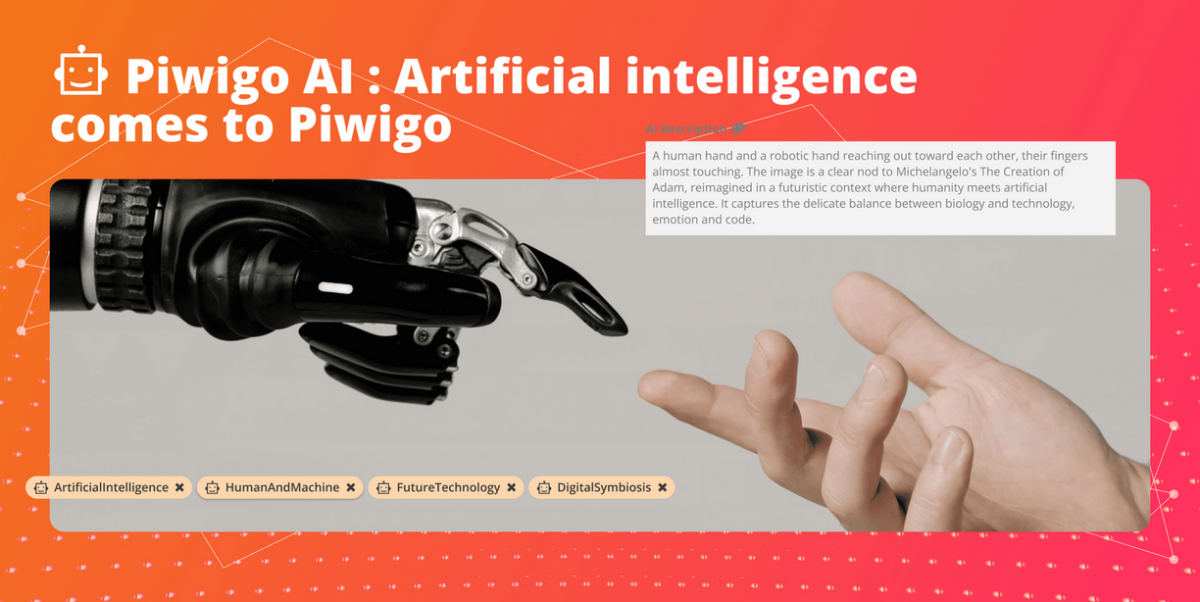
Why use AI in Piwigo?
You might be wondering:
“How could artificial intelligence be useful in Piwigo?”
The most obvious answer is automating photo indexing, such as adding keywords automatically.
Piwigo’s search engine relies on textual data linked to your photos: title, description, tags, albums…
But if your images are all thrown into a “misc” folder, named IMG_0123.jpg, with no tags or descriptions, search becomes almost useless.
Sure, you can filter by date or file format — but that’s about it.
For the search to be really helpful, your photos need to be indexed with titles, descriptions, tags…
And that takes time. Lots of it.
⇒ AI can do a first indexing pass in seconds. Our tests show the results are solid.
You can then review and edit the results as needed. And voilà — a well-organized, searchable photo library.
If you like, you can take a look below at some (non-contractual!) mock-ups of how these features could be integrated into Piwigo.
What we had before… and why it wasn’t ideal
A few years ago, Zacharie developed a plugin called Tag Recognition. It uses external services (like Microsoft or Imagga) to analyze photos and suggest tags.
It works, but there are two big issues:
- These are closed, proprietary services. We don’t control how they work or how your data is handled. That goes against Piwigo’s open-source values.
- They’re expensive. Imagga recently raised its base price to $70/month. Way too much.
What’s changed
Recent AI advancements have opened new doors. Today, it’s possible to run open-source AI models on your own server or a dedicated one.
Not on a tiny shared hosting server, of course, but on more powerful machines — like the ones we rent and manage for piwigo.com.
That’s exactly what we’re building. Pigolabs (the company behind Piwigo.com) will host an AI service that any Piwigo — including self-hosted ones — can connect to via a plugin: Piwigo AI.
What Piwigo AI can already do
Here’s what’s available in the first version:
- Auto-tagging (keyword suggestions)
- Description generation
- Text recognition in images (OCR)
And this is just the beginning. More features will come in future updates.
What about your data?
This is a top priority for us: your data remains yours.
The AI server we’re setting up:
- doesn’t know your Piwigo URL
- deletes your data right after processing
It receives a request, analyzes the image, returns the result, and deletes everything.
We don’t store anything, track anything, or try to collect any info. Period.
Pricing model
This service won’t be free, for two good reasons:
- It has real costs (servers, maintenance, development…), and it needs to be sustainable.
- Free services often lead to overuse. Running AI servers consumes energy, so it’s important to encourage thoughtful use.
We’re planning to use a credit system:
You’ll get some free credits to test the feature, and if you like it, you can buy more and use them as needed.
A smooth integration in Piwigo
For this to really work, it needs to be simple, fast, and built into your usual workflow.
That’s what we’re aiming for. Alice is working on the UI mockups, Willy is starting the integration, and the first version of the server is already running.
Now comes the hard part: making it feel seamless inside Piwigo.
You’ll be able to trigger AI analysis:
- when uploading a photo
- from batch management
- while editing a single photo
And you’ll be able to choose which actions to run — for example, OCR only, to save credits.
That’s where we are.
This is an ambitious project, and we wanted to share it with you early.
We know AI raises valid questions, and we want to build this in full transparency.
As always, your feedback is more than welcome!
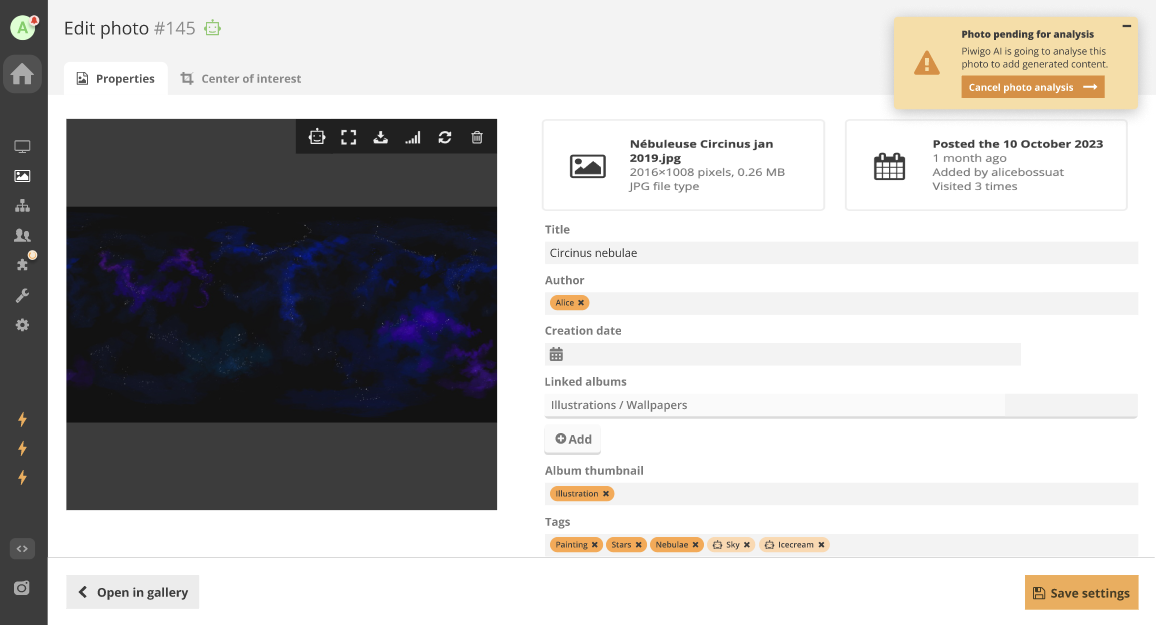
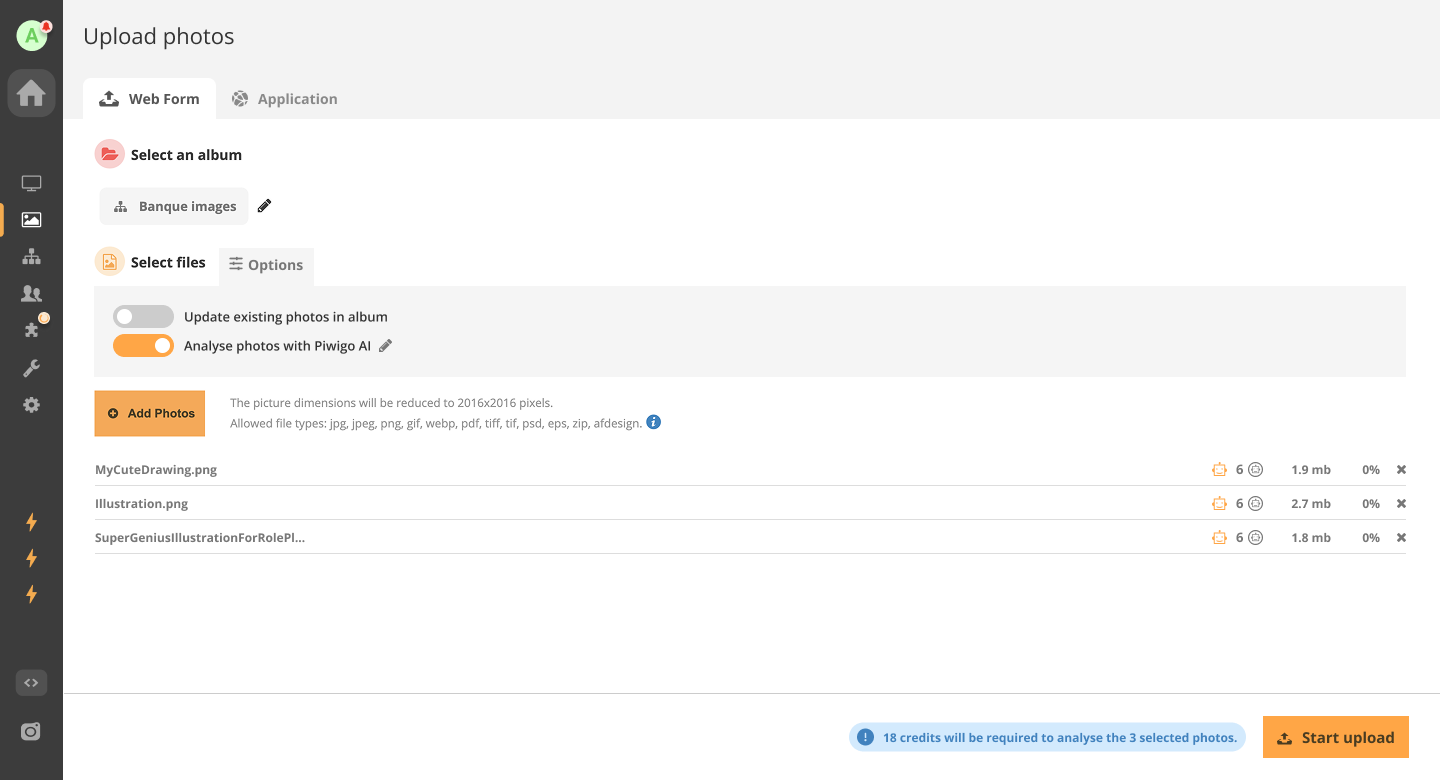
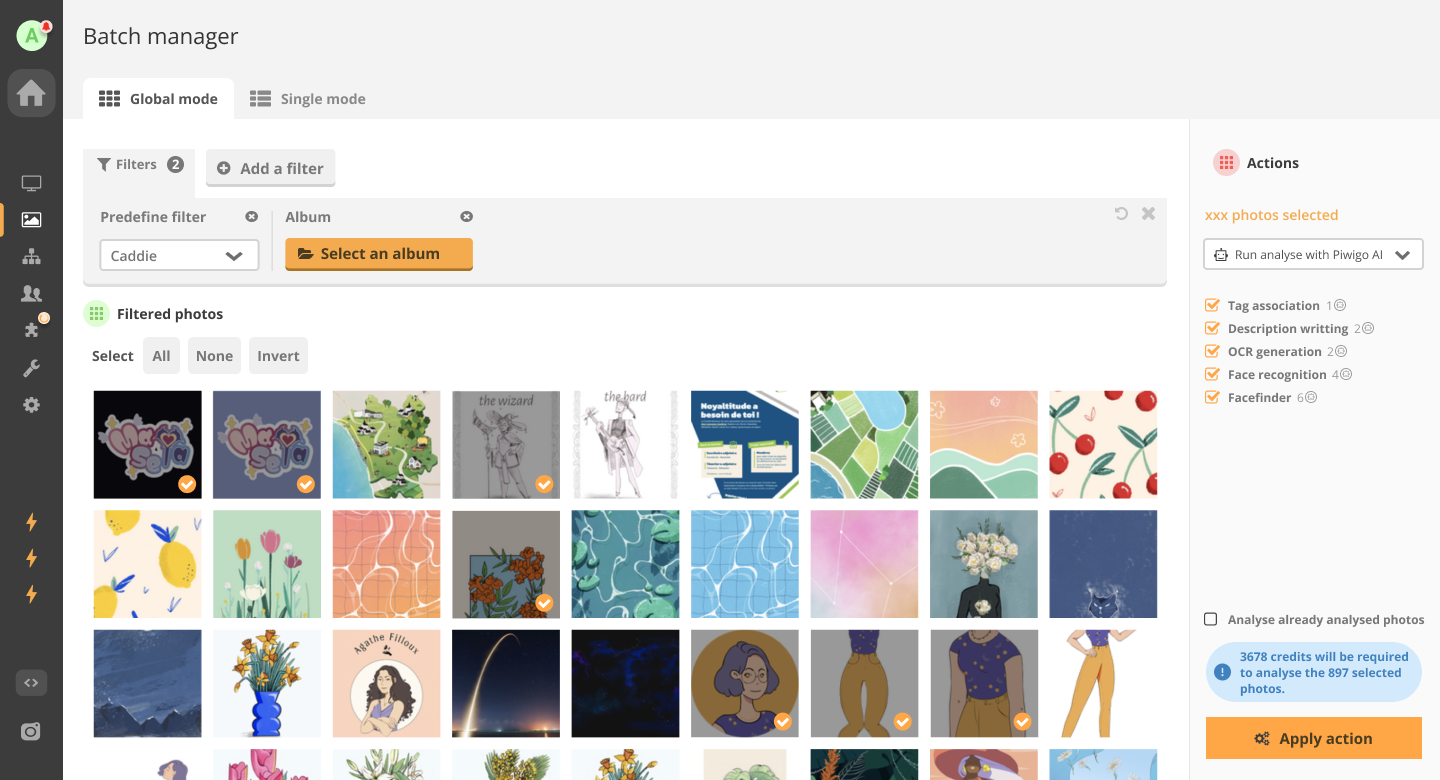
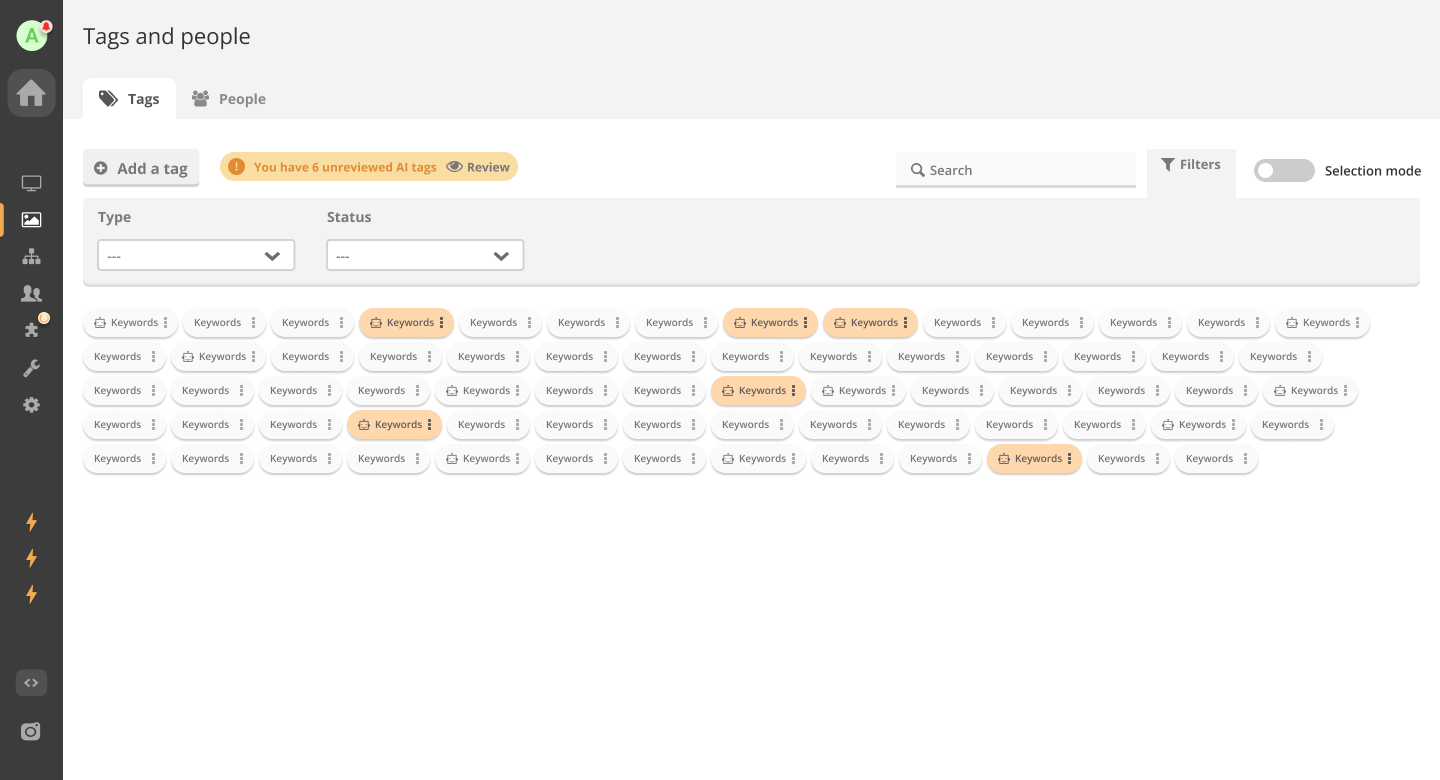
Great news!
I’m really excited to see AI coming to Piwigo – especially in a way that respects privacy and open-source values. Auto-tagging and description generation will save so much time, and the credit system sounds fair and thoughtful.
Big congrats to Pierrick, Willy, Alice, and the whole team – you’re doing amazing work! Looking forward to testing it out and seeing how it evolves. Thanks for the transparent and inspiring update!
Thanks Spiros !
OPT OUT OPTION OR I WILL USE A DIFFERENT PRODUCT THANKS
Of course will will never force you to use IA features. Piwigo AI is a plugin, so it is not mandatory !
I find this development distressing, for a large number of reasons.
– At a basic level, I don’t want AI anywhere near my personal information. It is not trustworthy (more below)
– In my experience once an application starts incorporating AI, a large majority of software development effort goes into the AI features. Non-AI features and bugs become neglected
– AI is a sociopathic technology that, up to this point, has been built on theft, grift, and hype; it also uses tremendous amounts of power and fresh water, increasing electricity costs and carbon footprint while depriving communities of drinking water
– So-called “open” models are not open in any real sense of that word. Even if you knew the weights, the training data, the training procedure, and the algorithm, you would still not be able to trace out how the weights and algorithm turn into the output, nor how the training data turned into the weights. The fact that you cannot know this is exactly the critique the open source community used when arguing against closed source software. Using neural network weights coming from a large corporation is no different from using closed source software coming from a large corporation. An opaque black box stuffed into your photo server is dangerous
– I suspect a lot of people chose Piwigo because it does not run AI stuff on our photos. I know that was a primary reason I chose it, anyway
None of this makes slightly better tagging worth it. I urge you to reconsider this path. I am now strongly inclined to switch out of Piwigo to some other photo sharing system, and will do so as soon as I see AI features launched live in it. I pulled my photos out of Google Photos in part because of the creepy AI they were continually pushing, and I’m not about to start tolerating that sort of thing again.
Thank you for your comment, we respect your opinion of course and you will never be forced to use Piwigo AI which will be available as a plugin (which can be deactivated / uninstalled).
The entire system is installed on our technical infrastructure and no data (especially not personal data) can leave it. And we won’t store anything after treatment.
We have no intention of prioritizing AI features. We ourselves are very critical of software publishers who implement “shiny” AI functionalities and neglect the maintenance of their product.
We totally understand if you don’t want your photos to be analyzed by AI, and Piwigo AI is designed for just that. But it’s true that many other users are eagerly awaiting AI in Piwigo, and we need to listen to them too. If you want, you can check out the forum, where Pierrick and Willy have provided additional information: https://piwigo.org/forum/viewtopic.php?id=34298
Agree 100. This is why I’ve used and recommended Pigigo for 10 years. Sadly, longer.
No one can help that there are folks (unquantifiable) asking for these features. People ask for all kinds of ill-advised things and struggle with basic understanding – that doesn’t mean we lower standards. Or it didn’t, anyway.
Please read my numerous replies before crying wolf. Implementing AI in Piwigo doesn’t mean “Piwigo is going to send all photos to openAI or Google”. Not a single second we wanted to do that.
What’s actually true in Anthony’s comment concerning Piwigo AI is that we don’t know how the AI model was trained. How much energy it used and if the photo used were provided with the explicit permission of their owner. We can’t know that :-/
What I know is that if Piwigo doesn’t provide AI analysis, many users will simply use another system that actually use your personal data.
Personnaly, I know Piwigo AI server won’t use your data. This is not our values. This is not what we want to do. We want to provide the features users are expecting and we want to do it the way Piwigo has always worked: with full respect of your personal data. Now you need to trust me, the same way you did for 24 years by using Piwigo to host your photo gallery.
“We don’t store anything, track anything, or try to collect any info. Period.”
…Until a court order compels you to do so, for whatever bullshit reason, along with a gag order.
The normal way Piwigo AI server will work is to delete any content it has temporarily stored during processing. A bit like a network device like a switch: the device is not designed to store data more than “buffer time”.
A court order might ask us to provide data we have. But if we have no data, how could we provide any data?
That’s not the same as Piwigo hosted on Piwigo.com: there we have data hosted. This is what Piwigo.com is designed for.
BobG, do you mean at some point a court order might ask us to convert our Piwigo AI server into a sophisticated spying machinery? where we would actually store the data going through the AI analysis. And that in the end, the AI thing would be just an excuse to actually spy on Piwigo community? Wouldn’t we kill our business by doing so? Wouldn’t we forget our values for privacy by doing so?
I don’t know if you’re a Piwigo.com client (since we’re here on Piwigo.com blog) but if that’s the case, the Piwigo AI server adds absolutely no such risk of spying. For self-hosted Piwigo, I agree the Piwigo AI server means the photos you select to be analyzed will go through our servers and you need to trust us for that.
Are you planning on allowing fully local processing? I would much rather be able to point piwigo at my own servers and never have to worry about my data going anywhere else
Hi Michael,
Planned, yes. Available right from the start, no. Once we have more than a POC (Proof of Concept), stabilized the AI model, we plan to release the Piwigo AI server to be installed on your own infrastructure. Then in your Piwigo local configuration, you will be able to tell your Piwigo to request your own Piwigo AI server instead of the one we will host on Piwigo.com.
There is zero reason to trust these systems, given their purpose and requirements. Zero. If Piwigo understood the valid questions (i.e., red flags), then you wouldn’t be pushing these systems or the misunderstandings around then. How many products need to lean into enshittification before companies stop?
I’ve learned the lesson, and I’m not hanging around to find out. Uninstalling and unsubscribing.
What do you mean by “these systems”? Your comment sounds like Piwigo is going to send your photos to chatGPT or Gemini for analysis. That’s exactly not what we designed, precisely because we don’t trust these systems and we strongly privacy over practicality.
As I wrote sooner on https://piwigo.org/forum/viewtopic.php?pid=192441#p192441 :
> In Piwigo, we sometimes rely on external software to extract metadata from photos (exiftool), resize photos (ImageMagick) or generate video previews (ffmpeg). You should consider Piwigo AI the same way: it’s just an external software that take your photo as input and outputs some tags and a description.
>
> So why don’t we simply use the AI engine the same way we use ImageMagick? Because Piwigo AI can’t run on your server. It may run on 0.001% of servers hosting Piwigo installations, but we don’t want to make this feature exclusive to those who have servers with a GPU. This is why we build a system hosting this AI engine. We want this new feature to be usable by any Piwigo, no matter how powerful its hosting server is.
If by “these systems”, you mean an external software we host on Piwigo.com servers, then why would you trust ImageMagick/Exiftool/ffmep more than “whatever script”?
> I’ve learned the lesson, and I’m not hanging around to find out. Uninstalling and unsubscribing.
As I wrote on the same forum comment : Make sure you don’t leave the good guys for the “less good” guys, because you think the good guys might become the “bad guys” even if they proved the oppposite for 24 years 😉
Gotta agree with a majority of the comments. I work with AI for a living, and honestly, thats a big reason why I dont use cloud AI in my personal projects. If I use AI at all, I run it locally and offline because that’s the only way I can trust whats actually happening to and with my data.
The big difference between something like ffmpeg, exiftool, imagemagick, etc. and a safetensor model is that the former are open source tools. We can compile and run them in a closed-loop, air-gapped environment and adjusting the coding as we need to. Unless we can do that with the AI you’re adding to Piwigo, I dont want it anywhere near my images.
I get that youre using open models and deleting images after processing, but that doesnt mean much without real transparency:
What vision and language models are you actually using? Are they real multimodal systems like blip, clip, or llava? Or are you just doing glorified keyword detection with coco like what ExcirePhoto tries to pass off as “AI”?
Where did the training data come from? Can you confirm that none of our images are ever used to improve the model down the road, now or in the future without direct consent or compensation?
You also mention this will be credit-based on Piwigo.com, which makes sense for hosted infrastructure, but that raises a concern:
If youre charging for the online version, are you going to lock the local model behind a paywall too? That’s the logical step for a company, and it worries me. The whole point of using Piwigo for many of us is to stay in control of our stack, our files, and our workflow.
Will the AI model for tagging be able to run WITHOUT Piwigo? How is it handling the metadata it generates? Is it embedding the captions as IPTC or EXIF? WIll it generate XMP sidecar files? How will this additional data, over time, contribute to hosted plans paying more money for less storage because its being used up by metadata files (I will admit that it will take a bit to get to this point, but sidecar files for example can add up quickly)?
Also, I get that you probably can’t answer this yet, but here are some real world concerns:
How does the model handle abstract or artistic images?
If the AI is turned on, are we going to have to inspect and fix every single caption or tag it generates, ending up doing more work than if we just handled metadata ourselves?
Whats your hallucination rate? Do you even measure that, and will we see confidence scores?
I want to like the idea of AI in Piwigo, but only if it’s optional, local, and trustworthy. Until then, Ill keep relying on tools I can run locally, offline, and on my terms.
Additionally, to your point of “Make sure you don’t leave the good guys for the “less good” guys, because you think the good guys might become the “bad guys” even if they proved the oppposite for 24 years” I just want to add that Google’s original motto was “Dont be Evil”
> If I use AI at all, I run it locally and offline because that’s
> the only way I can trust whats actually happening to and with
> my data.
Are you sure about that? What if the program detects it’s offline, stores your secrets in a hidden place, and waits for another time to send them? Obviously that sounds like a crazy scenario but…
> The big difference between something like ffmpeg, exiftool, imagemagick, etc. and a safetensor model is that the former are open source tools.
I don’t know what a “safetensor model” is and if it’s related to what we want to run Piwigo AI with. I’ll ask Willy. For me, the difference between “traditional software” and “AI model” is that “traditional software” got its decision tree written by humans. In an AI model, you have no idea what its decision tree looks like. Another way to differentiate these 2 kinds of software is : for a given input, the “traditional software” is supposed to always produce the same output, not the AI model.
So the underlying question is “can an AI model be opensource at all?”. Do humans audit the code of AI models? This is an open question, I don’t have the answer.
> Unless we can do that with the AI you’re adding to Piwigo, I dont want it anywhere near my images.
I understand and I respect your position. That’s why we have never thought AI would become a mandatory part of Piwigo kernel. First you will have to activate the plugin. Then you will have to ask Piwigo to analyse photos with AI. Nothing will be done “behind your back”.
> I get that youre using open models and deleting images after processing, but that doesnt mean much without real transparency:
I don’t agree. We expose our intention and the way we plan to implement AI for Piwigo. If you think that doesn’t mean anything maybe you don’t trust us in any way. Have you fully analysed Piwigo code before using it?
By exposing our strategy the way we do, we put our reputation in the balance. If that doesn’t mean anything to you, it’s not the same for me. I’ve been working on Piwigo for 24 years. Unless I have been faking my real intentions for so long, my words have an importance. When I say we have no intention to collect data, I really mean it.
> What vision and language models are you actually using? Are they real
> multimodal systems like blip, clip, or llava? Or are you just doing
> glorified keyword detection with coco like what ExcirePhoto tries to
> pass off as “AI”?
I don’t know. Willy (Linty) has worked on the prototype. He has already used several models for test. Nothing says the current one will be the one in 2 months or in 1 year. We may change it, depending on quality of results, energy consumption, speed performances…
> Where did the training data come from?
Good point. No idea. The providers of the AI models don’t give much details about that. I agree it’s a problem.
> Can you confirm that none of our images are ever used to improve
> the model down the road, now or in the future without direct consent
> or compensation?
I confirm we do not plan to train our model with data coming from users. Maybe in the future some clients will “ask” to train a custom model so that it provides custom results, but that’s another story and we won’t make such a move without asking users. That’s so obvious for me…
> You also mention this will be credit-based on Piwigo.com, which makes
> sense for hosted infrastructure, but that raises a concern: If youre
> charging for the online version, are you going to lock the local model
> behind a paywall too?
In the early stages of Piwigo AI, we will indeed provide it only as a paid service. Then, once stabilized, we plan to provide a procedure to reproduce the Piwigo AI server infrastructure to host it anywhere you want. In the Piwigo AI plugin (installed on your Piwigo) you will be able to configure it to use your own Piwigo AI server instead of ours.
We can’t embed the AI features as local features. It would hugely change the technical prerequisites to host a Piwigo. We don’t want that. It would be very frustrating for the vast majority of users wishing to use AI analysis.
> The whole point of using Piwigo for many of us is to stay
> in control of our stack, our files, and our workflow.
I understand, but don’t forget that we also have many clients on Piwigo.com who appreciate the “hybrid” way we provide software. Both opensource and cloud-hosted : free to come and go when they want, move their Piwigo to any hosting provider.
I would like to point out that for several years now, we have released the Tag Recognition plugin. It relies on external services: Microsoft or Imagga. I find it crazy that people have not really compplained about Piwigo sending photos to Imagga or Microsoft to get tags on their photos, but when Piwigo plans to propose such a feature with a strong focus on privacy, we’re pre-accused of trying to use your data. I find it crazy 😀 Do people really think we’re evil by doing the exact opposite of our exposed intention? Don’t you think it would have been smarter to release this AI feature silently just be saying “Piwigo 16 now automatically tags your photos” ?
> Will the AI model for tagging be able to run WITHOUT Piwigo?
Technically, yes. It will be HTTP-requestable as an API. We don’t really plan to have other (technical) clients than Piwigo installations, but hey we don’t know. If it’s crazy good and other image library software want to use it, then maybe it will be usable by other software. We have planned to have the “credit shop” provided in the Piwigo AI plugin in the Piwigo itself, so that doesn’t make it very “client agnostic” if you see what I mean.
In my opinion it’s far too early to consider Piwigo AI server outside the Piwigo ecosystem.
> How is it handling the metadata it generates?
The plan so far is to add a column “images.description_ai” and “images.ocr”. The AI description would be manually movable as the standard description. Even if not moved as standard description, it will be used in the search engine of your Piwigo. The AI description won’t be displayed on the page of the photo in the gallery.
The tags will be added as normal tags BUT they will be marked as “added by AI”.
> Is it embedding the captions as IPTC or EXIF?
If you perform a “metadata write” thanks to Write Metadata plugin, the tags will be written in IPTC. If you have copied the AI description in the standard description, it will also be written in the IPTC.
> WIll it generate XMP sidecar files?
Piwigo never writes XMP. From my point of view, this metadata format has not been really adopted. Photographers (and their software tools) have always keep using IPTC. So do we.
> How will this additional data, over time, contribute to hosted plans paying
> more money for less storage because its being used up by metadata files (I
> will admit that it will take a bit to get to this point, but sidecar files
> for example can add up quickly)?
That is completely neglectable. Let’s make a quick simulation. Imagine you have 10k photos, 2MB each. 20GB of photos. Now let’s say Piwigo generates a 400 characters description and we use a 4-bytes encoding, that’s 1600 bytes for each photo. That’s 16MB of descriptions for your whole gallery. That’s 0.08% of the total storage. Neglectable.
For your information, in Piwigo.com plans the storage capacities only include the original file, not the database, not the logs, not the generated multiple-size (this one can take quite some storage space…).
> Also, I get that you probably can’t answer this yet, but here are some real world concerns:
> How does the model handle abstract or artistic images?
I don’t even get the question. Can you provide an example?
> If the AI is turned on, are we going to have to inspect and fix every single
> caption or tag it generates, ending up doing more work than if we just handled
> metadata ourselves?
Sure, I strongly advise you to review what the AI has generated. Up to you to consider it saves you time to use AI or not.
> Whats your hallucination rate? Do you even measure that, and will we see confidence scores?
We have seen some hallucination on our photo sample. It depends on the model we use. I don’t expect AI to be perfect but I’m confident they’re getting better over time.
> I want to like the idea of AI in Piwigo, but only if it’s optional, local,
> and trustworthy.
We check the “optional” and “trustworthy”. We don’t check the “local” for now.
> Until then, Ill keep relying on tools I can run locally,
> offline, and on my terms.
Perfectly understandable, we won’t force anybody.
> Additionally, to your point of “Make sure you don’t leave the good guys
> for the “less good” guys, because you think the good guys might become
> the “bad guys” even if they proved the oppposite for 24 years” I just
> want to add that Google’s original motto was “Dont be Evil”
I didn’t see it coming! Please judge us on our actions. Not on what you project on us.
I’m no big fan of Google, to say the least. In my opinion they did well until they change the way they displayed their ads. In the first years, ads were contextual to the page where they were displayed. And that was fine. You opened a page about bakery, you got ads about bakery tools. Fine. But then they understood they could earn much more money by displaying ads depending on “who” opens the page. From this moment, they turned into “how can I know everything about everybody so that I can display the most relevant ad?”, leading to becoming the biggest consumer habits database in the world. Everything they do now is focused on this only target.
I hope you see the difference with what we do. Our business is to sell subscriptions to an image library system. We don’t care about user personal data. We care about making them safe but we don’t care about you prefering donuts or croissants!
You couldn’t expect AI would be thankfully received by every single user.
80% of all human beings are too stupid to even install Piwigo. They use those services that break the UI on this site and my nerves: You can‘t be serious about data privacy but also have those buttons on the left, buttons from „Big Tech“, showing your support of data theft.
So, you can reach about 20% of the rest of the world. Those people actively search for a photo management system.
I for my part first have a look at codeberg.org – because it is free like in „freedom“.
Then I have a few other tracking-free sources.
Then I search the web.
Lastly, I have a look at Github.
I never missed AI on Piwigo. The tagging is fine as it is. I just wanted a simple photo gallery that I can host myself without the need to have a master degree on Docker, npm & Co.
Open source doesn’t mean „free“. Home Assistant extremely depends on Github (Microsoft), I can’t do updates because backups are useless, because encrypted. My Pi-Hole can’t be updated anymore, because they have to deliver their own web server (how many web server softwares do you need on one machine?).
Don’t make the same mistake to render Piwigo useless. That’s all we are afraid of.
Promises are also very useless these days. We were promised, that nobody wants to build a wall. Short time later, there was a wall. And Germany was parted for 40 years. Including families and pets.
chatgpt integration please
Sorry but no, it’s against our principles and the wishes of our users, who don’t want to transmit data outside Piwigo.
I don’t think it will match my usecase, but I applaud your approach to AI. Going for a local model instead of shilling data out to the big players is very respectable.
AI biases are a valid concern, but your AI’s stated purpose is tagging and categorizing pictures. Not surveillance or police fotage but pictures by hobbyists and professional artists and photographers. Mistakes are hardly fatal.
And since you are keeping piwigo open while offering hosting, I do not doubt you could take a similar route for AI. Your track record speaks for itself.
Self-hosting any, not to mention AI-, services is difficult enough. As a user of your Piwigo hosting, I’d say if I can trust you with my photos, then I can trust your self-hosted AI, too.
Doubting one while trusting the other seems dubious.
I’m using immich in parallel – selfhosted. As as such I’m running locally an AI which does face recognition. I would guess at least 90% hit ratio – even over 20 years of a person.
It’s great to pick a person and see all pictures it shows up over many years.
Any plans of integrating this as well in your AI?
Hi, thanks for your message ! Yes, we plan to implement facial recognition soon 🙂